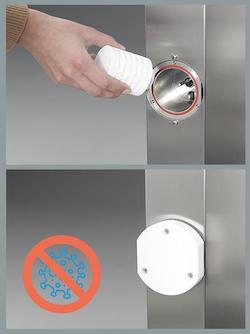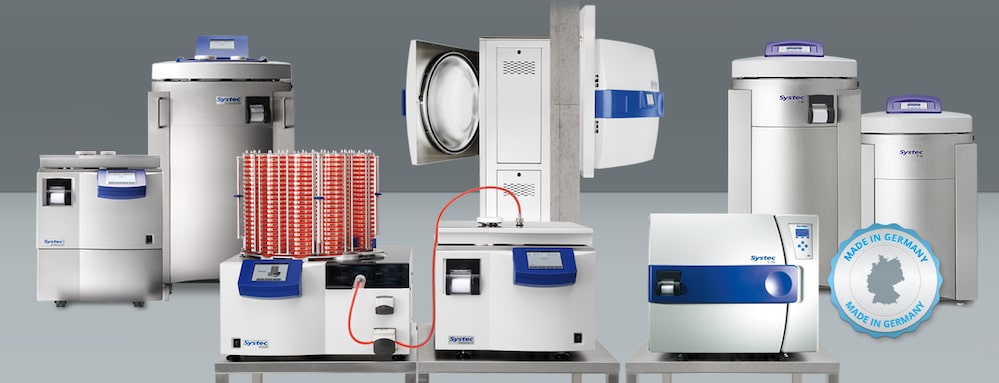Channels
Special Offers & Promotions
Reliable sterilization of coronavirus particles
The exhaust air filtration in Systec autoclaves reliably prevent hazardous aerosols from escaping during the autoclaving process.
Steam sterilization in autoclaves is used - especially in biological and medical laboratories - to inactivate natural or genetically modified microorganisms. However, during the heat-up phase, in which air is removed from the pressure vessel, biological agents can potentially escape into the work area as aerosols.
This means that exhaust air filtration is extremely important, especially in light of the current coronavirus epidemic. And while FFP masks and various filters with a pore size of 0.2 μm are theoretically incapable of catching pure COVID-19 particles due to the small size of the particles (between approx. 0.1 and 0.14 μm), tests show that the exhaust air filtration systems in Systec autoclaves reliably prevent hazardous aerosols from escaping during the autoclaving process.
 How exhaust air filtration works
How exhaust air filtration works
Systec products filter exhaust air by means of an autoclavable sterile air filter inside a filter housing and a PT-100 temperature sensor - the combination of these elements ensures reliable filtration of exhaust air: All air displaced from the autoclave is passed through the filter and, as a result, the microorganisms are retained in the filter. The filter is also sterilized “inline” during the sterilization process in order to inactivate the microorganisms contained in it. The temperature inside the filter housing is monitored by the above-mentioned PT-100 temperature sensor. During the heat-up and sterilization phases, the condensate is retained in the pressure vessel and also sterilized safely. Exhaust air filtration and condensate sterilization prevent any viruses or germs from escaping before the end of the sterilization phase. This ensures that all gases/liquids that could represent a potential hazard to the environment when displaced from the autoclave are filtered.
The filtering medium used by Systec GmbH is an autoclavable sterile air filter in the form of a PTFE membrane filter cartridge with a pore size of 0.2 μm. The filter cartridge is located in a pressure-resistant housing and can be replaced quickly at any time. The PTFE membrane is additionally protected by polypropylene nonwoven fabrics on the upstream and downstream sides. External support bodies and end caps made of a special, heat-stabilized polypropylene as well as internal support bodies made of stainless steel ensure exceptionally high thermal resistance and mechanical strength. The filters are monitored via a maintenance counter, with a replacement interval of 150 cycles.
To ensure a validatable filtration, the heating temperature of the autoclave is monitored throughout the process via a PT-100 temperature sensor (class A). At the same time, this sensor ensures that the filter cartridge is heated to a temperature that enables the safe inactivation of filtered particles. In the event of any deviation from the prescribed process sequence, the autoclave is put into a fault mode, which prevents the outflow of contaminated exhaust air. Furthermore, the integrated user management functionality prevents unauthorized access.
Proven filtration
The filter in the Systec autoclave was subjected to an integrity test to verify its retention capacity for aerosols. During the integrity test, a sterile air filter element was exposed to approx. 1012 particles of the critical particle size (0.1 Em to 0.3 Em)/test/min. The filters were tested under normal process conditions (sterilization temperature: 121 °C, holding phase: 20 minutes, gravity-based operation). The results showed a penetration of less than 0.00005% of the applied particles, Seite 3 von 4 i.e. any penetration of the filter by microorganisms of the typical size of SARS-CoV-2 particles is ruled out.
Advantages of Systec exhaust air filtration
- Safe retention of microorganisms in the potentially contaminated exhaust air displaced from the autoclave by filtration.
- In-line sterilization of the filter with continuous temperature monitoring. Following each sterilization cycle, the filter is sterile again.
- In-line sterilization of the potentially contaminated condensate in the autoclave chamber by steam injection.
Reliable sterilization of coronavirus particles
Every medical or biological laboratory that uses an autoclave to sterilize solids or liquids should use an autoclave with exhaust air filtration to ensure the safety of its employees. Based on Decision 2/2009 of the German Committee for Biological Agents (Ausschuss für Biologische Arbeitsstoffe (ABAS)), this procedure can be regarded as safe and reliable.
Any penetration of the filter by COVID-19 viruses is ruled out with reliable certainty: Although the viruses are theoretically small enough (0.16 μm) to pass through the membrane, in reality they are transported in larger droplets as aerosol and are thus retained by the filter. Even smaller particles (<0.1 μm) are first retained by the filter and then inactivated by the sterilization heat of the autoclave. Furthermore, a PT-100 temperature sensor ensures that this filtration process is reliable and validatable.
About Systec GmbH
Systec GmbH is a leading manufacturer of autoclaves (steam sterilization equipment), in particular laboratory autoclaves, media preparators, and dispensing devices for liquid media and microbiological culture media. Systec is certified in accordance with ISO 9001 and ISO 14001, and develops and produces a wide range of products for the modern laboratory in science and research, as well as biotechnology, pharmaceuticals, quality control, and production.
Media Partners



